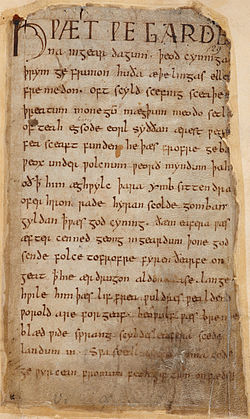|
Life in Anglo-Saxon England Part 5: Religion and LiteratureReligion The Saxon gods and goddesses were these:
Monks and other Christian dignitaries set up places of worship around the country. The most common of these was the monastery, where monks lived and studied. Like most other people at this time, monks grew their own food and made their own clothes. Monks also spent many hours at prayer, studying the Christian teachings and reflecting on their own lives. They also knew how to write, which was not a common skill in those days. Monks created copies of existing books by copying the words into blank books, adding their own illustrations as they went. Monks wore simple clothes, often went barefoot, and routinely had a bit of hair on the top of their head removed, to create what was called a tonsure. Larger monasteries were called abbies, and the head of an abbey was an abbot. Some abbeys were founded by women and run by women; one of the most famous of these was Nunnaminster, at Winchester. The only schools in Anglo-Saxon England were in monasteries. Boys sometimes studied at a monastery without living there. Girls also studied at monastery schools (but did not live in monasteries). Literature
Also surviving are other examples of epic poetry. The adventure poem, like Beowulf, was quite popular. Religious poetry was also well-known and written often. Surviving as well are other kinds of religious writings, such as sermons and accounts of the lives of saints. Another main kind of literature that has come down to us today is the riddle. The Anglo-Saxon peoples were very fond of riddles. One of the most famous monks in English history was Bede, known as the "father of history." His most well-known work was an 8th Century collection known as An Ecclesiastical History of the English People. Another well-known work from this period that survives and thrives is the Anglo-Saxon Chronicle, a collection of annals arranged by the year in which occurred the events described in each entry. |
|

 Christianity eventually took hold in Anglo-Saxon England, beginning in the late 6th Century. A monk named Augustine (later named St. Augustine) arrived in Canterbury, the capital of Kent, in 597. Augustine, on a mission authorized by the Catholic Pope Gregory I, found a warm welcome from
Christianity eventually took hold in Anglo-Saxon England, beginning in the late 6th Century. A monk named Augustine (later named St. Augustine) arrived in Canterbury, the capital of Kent, in 597. Augustine, on a mission authorized by the Catholic Pope Gregory I, found a warm welcome from  The most famous piece of writing is the tale of Beowulf, a prince who battled the fierce monster Grendel (and its mother). The story of Beowulf was told as a tale long before it was written down, and it was first written in the 8th or 9th Century.
The most famous piece of writing is the tale of Beowulf, a prince who battled the fierce monster Grendel (and its mother). The story of Beowulf was told as a tale long before it was written down, and it was first written in the 8th or 9th Century. 
